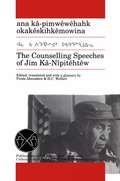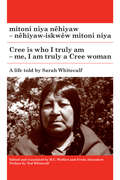- Table View
- List View
The Counselling Speeches of Jim Ka-Nipitehtew (Algonquian Text Society)
by Jim Kâ-NîpitêhtêwJim Ka-Nipitehtew was a respected Cree Elder from Onion Lake, Saskatchewan, who spoke only Cree and provided these original counselling discourses. The book offers the speeches in Cree syllabics and in Roman Orthography as well as an English translation and commentary. The Elder offers guidance for First Nations people in these eight speeches that cover the proper performance of ceremonies, words of encouragement for youth, information about collecting medicinal plants, directions for proper behaviour of men toward women, proper preparations for the Pipe ceremony, the role of the Pipestem in the Making of Treaty 6, the importance of tobacco, and examples of improper ritual behaviour in ceremonies. One of the most important speeches is the narrative of the Cree record for the treaty negotiations that took place in the summer of 1876. It was originally transmitted by Jim Ka-Nipitehtew's father directly to him and the authors comment on this remarkable chain of transmission. The book contains a Cree-English and an English-Cree Glossary. This is an important resource for Cree linguistics as well as those interested in understanding the Cree perspective of Treaty 6.
mitoni niya nêhiyaw / Cree is Who I Truly Am: nêhiyaw-iskwêw mitoni niya / Me, I am Truly a Cree Woman (Algonquian Text Society)
by Sarah Whitecalf H. C. Wolfart Freda Ahenakew Ted WhitecalfStrong women dominate these reminiscences: the grandmother taught the girl whose mother refused to let her go to school, and the life-changing events they witnessed range from the ravages of the influenza epidemic of 1918–20 and murder committed in a jealous rage to the abduction of a young woman by underground spirits who on her release grant her healing powers. A highly personal document, these memoirs are altogether exceptional in recounting the thoughts and feelings of a Cree woman as she copes with the challenges of reserve life but also, in a key chapter, with her loneliness while tending a relative’s children in a place far away from home – and, apparently just as debilitating, away from the company of other women. Her experiences and reactions throw fresh light on the lives lived by Plains Cree women on the Canadian prairies over much of the twentieth century. The late Sarah Whitecalf (1919–1991) spoke Cree exclusively, spending most of her life at Nakiwacîhk / Sweetgrass Reserve on the North Saskatchewan River. This is where Leonard Bloomfield was told his Sacred Stories of the Sweet Grass Cree in 1925 and where a decade later David Mandelbaum apprenticed himself to Kâ-miyokîsihkwêw / Fineday, the step-grandfather in whose family Sarah Whitecalf grew up. In presenting a Cree woman’s view of her world, the texts in this volume directly reflect the spoken word: Sarah Whitecalf’s memoirs are here printed in Cree exactly as she recorded them, with a close English translation on the facing page. They constitute an autobiography of great personal authority and rare authenticity.

